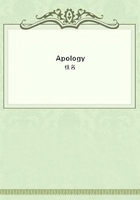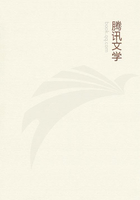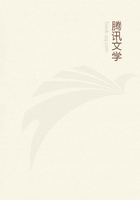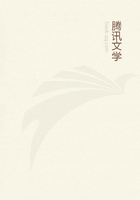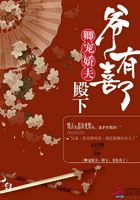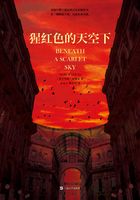She had preferred the country west of the River Brit to the upland farm for which she was now bound, because, for one thing, it was nearer to the home of her husband's father; and to hover about that region unrecognized, with the notion that she might decide to call at the Vicarage some day, gave her pleasure.But having once decided to try the higher and drier levels, she pressed back eastward, marching afoot towards the village of Chalk-Newton, where she meant to pass the night.
The lane was long and unvaried, and, owing to the rapid shortening of the days, dusk came upon her before she was aware.She had reached the top of a hill down which the lane stretched its serpentine length in glimpses, when she heard footsteps behind her back, and in a few moments she was overtaken by a man.He stepped up alongside Tess and said--`Good-night, my pretty maid': to which she civilly replied.
The light still remaining in the sky lit up her face, though the landscape was nearly dark.The man turned and stared hard at her.
`Why, surely, it is the young wench who was at Trantridge awhile - young Squire d'Urberville's friend? I was there at that time, though I don't live there now.'
She recognized in him the well-to-do boor whom Angel had knocked down at the inn for addressing her coarsely.A spasm of anguish shot through her, and she returned him no answer.
`Be honest enough to own it, and that what I said in the town was true, though your fancy-man was so up about it - hey, my sly one? You ought to beg my pardon for that blow of his, considering.'
Still no answer came from Tess.There seemed only one escape for her hunted soul.She suddenly took to her heels with the speed of the wind, and, without looking behind her, ran along the road till she came to a gate which opened directly into a plantation.Into this she plunged, and did not pause till she was deep enough in its shade to be safe against any possibility of discovery.
Under foot the leaves were dry, and the foliage of some holly bushes which grew among the deciduous trees was dense enough to keep off draughts.
She scraped together the dead leaves till she had formed them into a large heap, making a sort of nest in the middle.Into this Tess crept.
Such sleep as she got was naturally fitful; she fancied she heard strange noises, but persuaded herself that they were caused by the breeze.She thought of her husband in some vague warm clime on the other side of the globe, while she was here in the cold.Was there another such a wretched being as she in the world? Tess asked herself; and, thinking of her wasted life, said, `All is vanity.' She repeated the words mechanically, till she reflected that this was a most inadequate thought for modern days.
Solomon had thought as far as that more than two thousand years ago; she herself, though not in the van of thinkers, had got much further.If all were only vanity, who would mind it? All was, alas, worse than vanity -injustice, punishment, exaction, death.The wife of Angel Clare put her hand to her brow, and felt its curve, and the edges of her eye-sockets perceptible under the soft skin, and thought as she did so that a time would come when that bone would be bare.`I wish it were now,' she said.
In the midst of these whimsical fancies she heard a new strange sound among the leaves.It might be the wind; yet there was scarcely any wind.
Sometimes it was a palpitation, sometimes a flutter; sometimes it was a sort of gasp or gurgle.Soon she was certain that the noises came from wild creatures of some kind, the more so when, originating in the boughs overhead, they were followed by the fall of a heavy body upon the ground.
Had she been ensconced here under other and more pleasant conditions she would have become alarmed; but, outside humanity, she had at present no fear.
Day at length broke in the sky.When it had been day aloft for some little while it became day in the wood.
Directly the assuring and prosaic light of the world's active hours had grown strong she crept from under her hillock of leaves, and looked around boldly.Then she perceived what had been going on to disturb her.
The plantation wherein she had taken shelter ran down at this spot into a peak, which ended it hitherward, outside the hedge being arable ground.
Under the trees several pheasants lay about, their rich plumage dabbled with blood; some were dead, some feebly twitching a wing, some staring up at the sky, some pulsating quickly, some contorted, some stretched out - all of them writhing in agony, except the fortunate ones whose tortures had ended during the night by the inability of nature to bear more.
Tess guessed at once the meaning of this.The birds had been driven down into the corner the day before by some shooting-party; and while those that had dropped dead under the shot, or had died before nightfall, had been searched for and carried off, many badly wounded birds had escaped and hidden themselves away, or risen among the thick boughs, where they had maintained their position till they grew weaker with loss of blood in the night-time, when they had fallen one by one as she had heard them.
She had occasionally caught glimpses of these men in girlhood, looking over hedges, or peering through bushes, and pointing their guns, strangely accoutred, a bloodthirsty light in their eyes.She had been told that, rough and brutal as they seemed just then, they were not like this all the year round, but were, in fact, quite civil persons save during certain weeks of autumn and winter, when, like the inhabitants of the Malay Peninsula, they ran amuck, and made it their purpose to destroy life - in this case harmless feathered creatures, brought into being by artificial means solely to gratify these propensities - at once so unmannerly and so unchivalrous towards their weaker fellows in Nature's teeming family.

